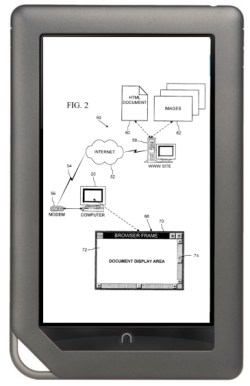 The licensing fracas Microsoft is whipping up around Android and, in particular, Barnes & Noble’s Nook e-reader gets another chapter today, as B&N submits its 50-page response to Microsoft’s suit. Their position and language are aggressive out of the gate, accusing Microsoft of trying to “marginalize the competition” and describing the contents of the patents in question as “highly obvious at the time [they] were filed.”
The licensing fracas Microsoft is whipping up around Android and, in particular, Barnes & Noble’s Nook e-reader gets another chapter today, as B&N submits its 50-page response to Microsoft’s suit. Their position and language are aggressive out of the gate, accusing Microsoft of trying to “marginalize the competition” and describing the contents of the patents in question as “highly obvious at the time [they] were filed.”
It’s a bold rebuttal, but not entirely convincing. Amazon and HTC, after all, didn’t find the terms onerous enough to object, and countless other companies great and small find licensing patented Microsoft software and patents no problem at all. But by attacking the patents themselves and Microsoft’s greater market-driven intentions, they might be able to poison the well sufficiently to make their case at least plausible.
The most common response, even though I know it’s just legal boilerplate, just cracks me up: “Barnes & Noble is without knowledge or information sufficient to form a belief as to the truth of the allegations of this paragraph and, therefore, denies them.” I don’t know what you’re talking about, so I’m just going to say no.
The meat of B&N’s “affirmative” defense is alleging that Microsoft (as MG suggested at the time, and as I suggested many patents of this type were last year) is overextending the scope of outdated patents granted in haste in order to “dominate, control, and exclude” players like Android and Chrome.
There are then many pages of B&N describing the slightly shady (but probably par for the course) methods by which Microsoft attempted to bring them into the fold. The licensing fees and terms are variously described as “exorbitant,” “unjustified,” “shocking,” “absurd,” and more. Again, other companies have thought otherwise, but it’s possible that B&N is standing up to Microsoft bullying, while the others thought it safer to just hand over the lunch money. Microsoft’s conduct is called into question at nearly every step, and yes, there is antitrust talk.
B&N is attempting to take a shortcut by sidestepping the allegations and going straight to the root of the problem: a set of patents it sees as unenforceable. But is that really a shortcut? I think it was a mistake to impute Microsoft’s motives as malicious on such a grand scale. Why not say “these patents are not valid, we’re going to sue to have them rescinded” and leave it at that? Didn’t they hear? Demonizing Microsoft is so over.
In a case of this scale, however, there is no short road. We’ll be hearing about this later when Microsoft withdraws, B&N capitulates, or the USPTO withdraws their approval. I don’t know which of those is the least likely. You can read the whole response below: